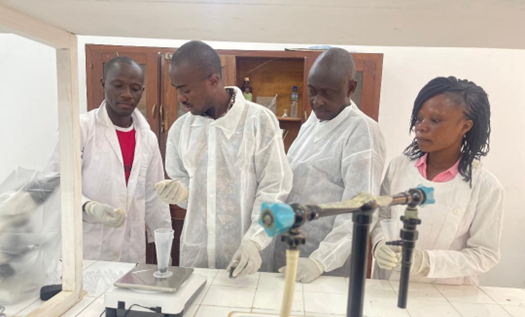Internships are an opportunity for veterinary para-professionals (VPP) to discover the professional environment and, above all, to acquire practical and clinical skills. Internships have therefore been incorporated into the new training curricula developed as part of the P3V project and validated in each country. The P3V project provided assistance to establishments in organising student placements. The approach consisted of helping schools to identify placement structures, validating the skills to be developed during placements and then paying an allowance to students on placement. Overall, the internship structures identified veterinary practices and pharmacies as well as non-governmental organisations in both countries. In 2023, 67 students, including 19 women (28.3%) in Togo, and 93 students, including 30 women (32.2%) in Senegal, received a placement allowance. This activity was very well received by the schools, which appreciated the Project’s approach. Discussions are underway to renew this support for 2024.
In addition, as part of this activity, equipment was offered to veterinary practices and pharmacies identified as training centres. The equipment consisted of automatic syringes for poultry and ruminants, bolus applicators, stethoscopes, electronic thermometers, toolboxes, etc. The presidents of the statutory veterinary bodies (VSB) in Togo and Senegal, on receiving the equipment on behalf of the veterinary practices and pharmacies, expressed thanks to WOAH and the Agence Française de Développement (French Development Agency or AFD)
A participant to the training of trainers (ToT) for the ALERT game
During the various diagnostic activities carried out as part of the P3V project, it was noted that there was limited implementation of clinical and practical training in the partner establishments. However, in the opinion of the various stakeholders, clinical and practical training should be an essential part of the training of veterinary para-professionals (VPPs). Training establishments have therefore expressed a need to strengthen clinical and practical training. The initial response to this need was to include courses relating to clinical and practical training in the training curricula for VPPs, which were developed and adopted in 2022. Subsequently, the P3V project supported each of the training establishments with veterinary and laboratory equipment. This equipment consisted of clinical examination and therapeutic aids (thermometers, stethoscopes, automatic syringes for ruminants and poultry, etc.), tissue sampling equipment (needles, tube holders, blood and faeces sampling tubes, swabs, etc.), animal health management equipment and laboratory equipment, biosafety management equipment (gloves, dustbins, disinfectants, etc.), and microbiological and parasitological analysis equipment (test tubes, photonic microscopes, slides, staining kits, etc.). This equipment was received in the establishments and a room was identified for the disposal of the equipment.
In order to optimise the use of this equipment and its application in clinical and practical training, training of trainers (ToT) was carried out in each of the establishments. This training was conducted by an expert from the EISMV : Ecole Inter-Etats des Sciences et Médecine Vétérinaire de Dakar, a partner in the implementation of the P3V Project. This intervention by the EISMV in the establishments enabled a reorganisation of the clinical and practical teaching. This reorganisation was aimed at validating -within each establishment- the clinical and practical teaching activities to be implemented with the equipment offered. As a result, the following activities were integrated into the practical and clinical activities of the establishments:
Teachers were then trained in the use and maintenance of the equipment provided. Various topics were covered during the training, including tissue sampling, clinical examination of animals, maintenance of equipment donated by the Project, coprological (faeces), haematological (blood) and bacteriological (bacteria) laboratory analyses, waste management during clinical and practical activities, and the use of automatic syringes for poultry and ruminants. In all, this training has enhanced the skills of 33 teachers, including 8 women in both countries. This intervention in the schools was greatly appreciated by each of them, and one of the managers thanked WOAH in the following terms: “The P3V project is making a significant contribution with concrete actions to improve our technical facilities. Teachers will now be able to carry out practical work that was previously difficult to do”.

